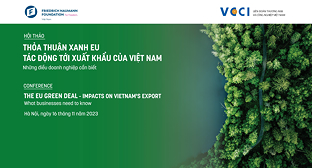Thailand and Japan officially signed the FTA
03/04/2007 12:00
During his first visit to Japan after coming into office, Thailand’s Prime Minister, Surayud Chulanont officially signed the Free Trade Agreement (FTA)-,setting a new landmark for trade relations between the two countries.
On April 3rd, Tokyo (Japan), Thai Prime Minister Surayud Chulanont and his Japanese counterpart- Shinzo Abe signed this important accord with a desire to improve their trade relation to a higher position and broaden the bilateral trade.
The content of the agreement has been completed by many rounds of bilateral discussion and was passed by Thai Cabinet last March 27th, leading to Prime Minister Surayud Chulanont ‘s signing the accord in his visit to Japan.
Under this accord, in 10 years, Thailand and Japan will step by step cut tariffs on 90% traded goods and Thailand committed to protect the benefits of Japanese investors. The negotiations for this accord were completed last year but their planned signing ceremony was delayed by a military coup on September 19th.
At this time, Japan is the biggest investor and the second biggest import market of Thailand, mainly in farm products. The total trade figure between the two countries from January to December 206 reached $44.1 billion. Thailand hopes that this agreement will help to boost farm product exports, attract more investment in car production, improve the competitiveness of its investment environment and encourage the development of service sector…
Certainly, there existed different point of view among Thai citizens about the legality and economic benefits gained after signing the bilateral with Japan at this time.
Some said that in terms of legality and temporary appointment of Thai government, Thailand government is not eligible enough to sign a FTA with other countries. Meanwhile, others concerned that the draft of this agreement has not considered the disadvantaged competitiveness of many domestic products over Japanese goods such as cars, vehicles spare parts and steel,…
Many Thai consumers are very happy to welcome the cheaper goods from Japan due to lower import duty while this worried domestic producers. They are afraid that some Japanese producers may transfer their firms to Thailand, and therefore, the competitiveness of Thai goods will be reduced.
Tokyo has been pushing to forge free-trade agreements with other countries
Since the first FTA with Singapore in 2002, Japan has signed FTA with Mexico, Malaysia and is now conducting negotiations with other Asian countries. Before this agreement with Thailand, Japan has been seeking and negotiating with many countries about FTA, which shows its strong desire to sign FTA.
For example, on March 13th, Japan and Sweden held up a meeting in Tokyo to prepare for the negotiations between the two countries about FTA- the first FTA between Japan and an European country. At the meeting, the two sides discussed the frameworks and procedures of negotiations on Economic Partnership Agreement (EPA) in order to ensure that the negotiation process will go in the right way. FTA plays an essential part in the EPA.
Japanese Minister of Foreign Affairs- Taro Aso has said on March 9th that Japan and Australia would carry out the first round of negotiation on their bilateral FTA on April 23rd and 24th in Canberra. Mr. Sao also said that :” We should make more efforts so that Japan can gain the most benefits in these negotiations due to the sensitiveness of the issues”.
Agriculture related issues are considered the main obstacles in negotiations between the two countries because of Japanese agriculture protection policies, especially rice, wheat, and dairy products. Japanese agricultural organizations are lining up to request the government not to liberalize farm product trading in the agreement with Australia.
On March 27th, Tokyo, Japanese Minister of Foreign Affairs- Taro Aso and Chilean Minister of Foreign Affairs- Alejandro Foxley signed the FTA between the two countries. This is the first FTA of Japan and a South American country which is supposed to be enforced in the next fall. This agreement will cut 90% of tariffs on goods traded between the two countries, mainly minerals, meat, fish, wine, electronics and cars.
On the other hand, Japanese and ASEAN officers have recently announced that they cannot completed the negotiations on EPA due to the slow development of negotiations on free trade and goods, but they hope that the accord can be signed in this summer.
04/04/2007
Source: vietnamnet
Các tin khác
- More efforts needed to maintain export growth to China: Insiders (24/04/2024)
- Shadow trade minister calls for greater focus on removal of Chinese trade barriers (24/04/2024)
- New U.S. Solar Panel Tariff Intensifies Sino-American Green Tech War (24/04/2024)
- It is expected that there are higher orders and revenue in the second quarter from European businesses (24/04/2024)
- U.S. Ceramic Manufacturers Seeking Tariffs Against Indian Import (24/04/2024)
 Home
Home
 About Us
About Us




















